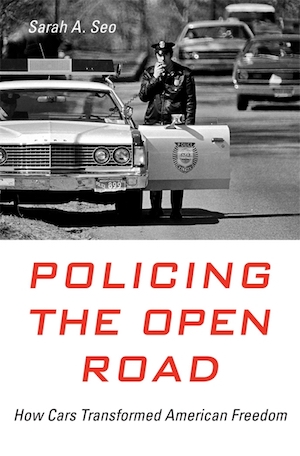Winner of the 2020 Ralph Waldo Emerson Award
By Allen D. Boyer
This book is a reminder that the automobile changed American society as broadly as the internet would – and, beyond that, that managing traffic has given the police the opportunity to manage American life. Policing the Open Road by Sarah Seo (ΦBK, Princeton University) is a rare, readable, illuminating piece of scholarship. The call for studies of “law and society” has long been heard; this book resoundingly rises to that challenge.
In 1949, looking back at the last half-century, the pioneering legal historian Willard Hurst counted the ways in which the car had changed American law. He identified 119, in fields ranging from the law of innkeepers to the contracts that tied together the auto industry. This offers Seo a starting point: the way in which the automobile has changed American law enforcement.
Police departments of the 1920s found themselves forced to manage traffic instead of fighting crime. They moved from arresting violators to issuing summons for violations – the first traffic tickets. Meantime, the dawning age of the automobile coincided with the era of Prohibition, generating a host of new cases on highway stops, roadside searches, and police conduct.
In 1925, the United States Supreme Court decided Carroll v. United States. Carroll held that, due to the mobility of an automobile, lawmen needed no warrant to search a stopped car, so long as there was probable cause to believe that evidence might be found and the car might otherwise be removed. The Court conferred substantial discretion upon lawmen, so long as there was a basis for their actions.
For the justices, Seo writes, “the Carroll standard struck the perfect balance between the need to give law enforcement some flexibility to meet the exigencies of automobility on the one hand, and individual freedom to drive on the other.” However, the decision carved out the “automobile exception” of Fourth Amendment search-and-seizure jurisprudence, an exception that perennially tests the constitutional requirement of reasonable searches and court-approved warrants.
Police departments moved away from the beat system, in which the officers of a precinct house were expected to know their neighborhood and its people. The new regime of policing relied on traffic stops. Notoriously, in post-war years, Los Angeles used the roadblock as a dragnet – not as a last resort to catch a fleeing perpetrator, but in hopes that searching a line of immobilized vehicles would produce a trove of contraband. At the first “crime-crusher blockade,” the LAPD netted 72 suspects and more than 50 weapons. Black drivers found out that they risked being ticketed, or worked over, by bigoted lawmen. (In his early days in Montgomery, Martin Luther King was arrested four times – once for speeding.)
As calls for a “war on crime” became familiar, law professor Charles Reich addressed a new issue by condemning “Police Questioning of Law Abiding Citizens.” This law journal article, Seo suggests, may have been as prescient as Reich’s epochal article on “The New Property.” It echoed in Papachristou v. City of Jacksonville (1972), which struck down an ordinance against loitering, stretched into a charge of “prowling by auto.”
At present, the doctrine of “criminal patrol” holds sway. Seo questions this doctrine and its “complete merger of crime fighter and traffic cop.” She highlights a recent case from Milwaukee. Two squad cars, patrolling a high-crime area, noted a suspected parking violation and leveraged this offense into felony charges.
“One officer saw a backseat passenger, Randy Johnson, make suspicious movements and ordered all occupants out of the car. The door ajar, the officer noticed a gun on the floor. Johnson was subsequently handed [over] to the federal government for prosecution on the charge of possessing a weapon as a felon . . . .
“It is stunning to consider how the authority to stop cars for minor traffic offenses, combined with the authority to stop people for brief questioning, has burgeoned into a full-fledged crime-control strategy involving multiple patrol officers equipped with squad cars, guns, and lights.”
Traffic stops continue to command an inordinate amount of public attention – from citizens and lawmakers as well as judges. Since last year, when Policing the Open Road was published, American law enforcement has been condemned for needless violence and inherent bias. This crisis adds a new resonance to the warning with which Seo concludes: “American law may have settled on a solution to the paradox of police discretion in a society committed to the rule of law. But one era’s answers may not be sufficient to solve another generation’s problems, a challenge that may require defining freedom anew.”
Allen D. Boyer (ΦBK, Vanderbilt University) is a lawyer and writer in New York City. He is currently at work on a history of the law of treason in England. Vanderbilt University is home to the Alpha of Tennessee chapter of Phi Beta Kappa.




